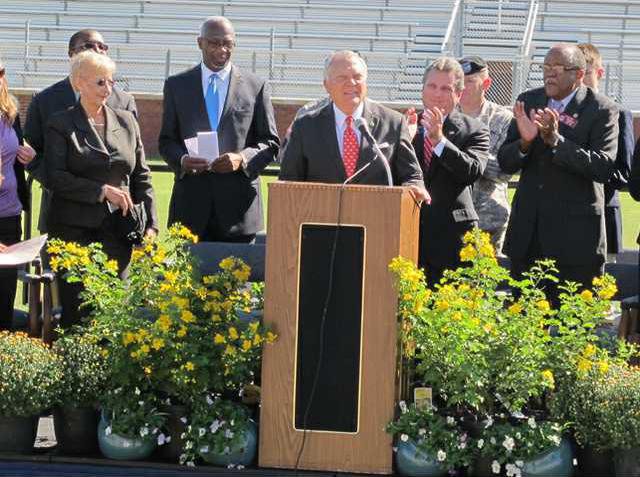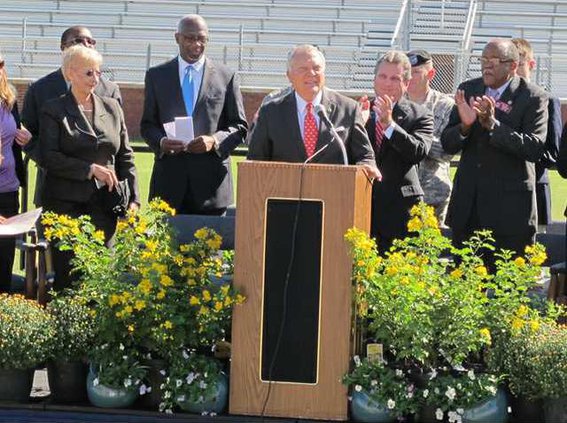Georgia Gov. Nathan Deal spoke Wednesday for a full 30 minutes about job creation and growing the economy, educating the future workforce, benefits of the port-expansion project and criminal justice reform during his visit to Liberty County.
Deal and his wife, Sandra Deal, joined local leaders and State Sen. Buddy Carter, R-Pooler, and Rep. Al Williams, D-Midway, on stage at Bradwell Institute’s Olvey Field. The Liberty County Chamber of Commerce hosted the event.
Liberty County Board of Education Chairwoman Lily Baker, Hinesville Mayor Jim Thomas, Liberty County Commission Chairman Donald Lovette, Fort Stewart Garrison Commander Col. Kevin Gregory and Joseph Martin Elementary School student Elizabeth Rogers greeted the governor and Georgia’s first lady. United Ministerial Alliance President Pastor Richard Hayes offered a prayer before Deal delivered his address.
Thomas thanked the governor for his role in helping to bring a new Armstrong Atlantic State University to Liberty County and for the Military Education Compact, which prevents military dependents from losing class credits when they transfer from one school system to another.
Young Rogers stole the podium when she told Deal that Liberty County students and community members fashioned the world’s largest crayon by melting 119,000 crayons “in a Lowcountry boil pot.” The recycled crayon stands 9.5 feet tall and weighs more than 650 pounds, she said. Rogers was featured on the cover of a recent chamber publication, according to Leah Poole, CEO of the chamber and the Liberty County Convention and Visitors Bureau.
Students from Button Gwinnett Elementary School and First Presbyterian Christian Academy made the governor’s visit into an educational field trip.
Button Gwinnett Assistant Principal Delores Crawford said students are studying the separation of powers and branches of government.
Button Gwinnett third-grader Nikaylah Coprick said she would like to run for office one day. Given the chance, she said she’d ask the governor how laws are made. Her classmate, Samiya Roberts, said she would ask Deal what he is doing to improve government.
FPCA students also are studying government. Eighth-grader Bryce Stafford said he wants to know “how much time (Deal) has to himself when he’s not on the job.”
“I don’t think I’d have the patience to become governor,” FPCA sixth-grader Kyle Osteen said. He added that he’d like to ask Deal why he became governor.
The governor’s speech
Deal’s first topic was job creation. He said more than 177,000 private-sector jobs have been created in Georgia since he took office in January 2011. Deal said 3,000 of those jobs have been created in Coastal Georgia, with 100 of them in Liberty County, thanks to Firth Rixson.
The governor said he is determined to make Georgia the No. 1 state for doing business. The Georgia General Assembly took a step in that direction by agreeing to roll back an energy sales tax on manufacturers during the next four years, he said.
Another component to increasing jobs in Georgia is the Port of Savannah deepening project, Deal said. The U.S. House on Wednesday passed legislation that will allow Georgia to spend the $231 million the state has allocated for the project. Georgia Ports Authority currently generates more than 350,000 jobs, officials say.
Supplying a well-educated and skilled workforce is another key factor in drawing businesses to the state, Deal said.
“We can’t attract jobs without that,” he said.
The governor said now that more military members are separating from the service due to the drawdown of troops overseas, they must be assisted in transferring their military job skills to the civilian workforce.
“I don’t want to see our veterans on the unemployment rolls,” Deal said.
He said his administration has worked to shorten the licensure process for veterans and to recognize here in Georgia the licenses military spouses have earned in other states. He added there is a shortage of operators with commercial driver’s licenses in Georgia, which is why he supports the Troops to Trucks initiative.
The program will allow qualified military-service members to apply for a CDL without having to take the road-skills test, according to the Georgia Department of Drivers Services’ website.
Military service members who have been honorably discharged within 90 days or less or have experience operating a commercial motor vehicle of the same class and type for at least two years prior to an honorable discharge qualify for the program, according to dds.ga.gov.
Deal praised the state’s technical-college system. He also said funds have been added to the state’s education budget to hire reading mentors in public schools. The governor said too many students are being promoted past the third grade without mastering basic reading skills.
Deal also spoke about his efforts to reform the criminal-justice system, focusing on adult non-violent offenders and juvenile offenders. Georgia had the fourth-highest prison population in the country when he became governor, according to Deal, who added that Georgia spends, on average, $1.2 billion on the correctional system each year.
“It costs $18,000 a year for a bed for an adult offender,” he said. “It costs upwards of $90,000 a year for a bed for a juvenile offender.”
Deal said the state is attempting to cut down on recidivism of adult and juvenile offenders rather than spend tax dollars to build more prisons.
“I was a juvenile court judge,” Deal said, recalling he had two choices when sentencing a youthful offender — either send them back home or incarcerate them in a youth-detention facility. Sometimes, neither choice was appropriate, he said.
To help rehabilitate non-violent offenders, accountability courts have been created. These courts address offenders’ substance-abuse and mental-health issues and the particular challenges faced by veterans, the governor said.
Deal said the state’s criminal-justice-reform council also is working on ways to ensure long-term felons are able to find places to live and jobs upon release from prison.
“If they don’t find those two things, it’s likely they’ll wind up back in our criminal-justice system,” he said.
The governor encourages religious and civic groups to get involved in helping solve the state’s problems.
“Government cannot do it by itself,” Deal said.
Governor talks growth, port expansion


Sign up for our e-newsletters